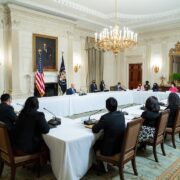
UNITED States President Joe Biden and Vice President Kamala Harris on Thursday, August 5 met with Asian American and Pacific Islander (AAPI) leaders to discuss key issues affecting the fastest-growing electorate in the country.
Biden and Harris’s meeting with community leaders — which some AAPI Democrats believe is overdue given the rise in anti-Asian discrimination that began last year — covered a wide variety of topics from economic equity to immigration reform.
In his opening remarks, Biden addressed the ninth anniversary of the shooting at a Sikh temple in Oak Creek, Wisconsin by a white supremacist. He said that shooting, which took the lives of six people, exemplifies the ongoing racism and discrimination of AAPIs which often goes unaddressed.
“Today, we honor everyone impacted by this tragedy. And we think about all the pain during this pandemic, with the rise of hate crimes, harassment, bullying, and other forms of bias against Asian Americans. It seems not to stop,” Biden said on Thursday.
The meeting comprised a wide range of topics, but voting rights was the pressing issue among the leaders present at the meeting.
Christine Chen, executive director for Asian and Pacific Islander American Vote (APIAVote), was among the dozen leaders present at the meeting, and she said that the administration affirmed its support for two voting rights measures, the For the People Act and the John Lewis Voting Rights Advancements Act.
The For the People Act was drafted in response to the Jan. 6 attack on Capitol Hill by pro-Trump rioters and the wave of local and state bills that restricted voting access in communities across the country.
The John Lewis Voting Rights Advancements Act — named after the late famed civil rights activist and U.S. congressman — seeks to update the historic Voting Rights Act to prevent certain states and jurisdictions from passing laws that suppress the right to vote.
Chen acknowledged that neither of these bills directly combat voter suppression but that they are a step in that direction.
“While [these bills] may not take a straightforward path, we were reassured that it remains a high priority,” Chen said after the meeting. “We will continue to work with the administration to ensure stories from our community are used as examples of the danger these anti-voter laws have.”
Voter suppression, though usually discussed in the context of the Black and Latino communities, has a history of negatively affecting the AAPI community. States like Georgia have laws that limit language accessibility, which affects a vast chunk of non-English-speaking AAPI voters, which the American Bar Association calls “immigrant-specific voter suppression.”
The lack of multilingual voting materials and resources has been a key issue among AAPIs for years, and the passing of restrictive voting laws in GOP-majority states like Georgia, Texas and Arizona has catalyzed AAPI leaders to demand inclusivity in voting practices.
“As the narrative surrounding the AAPI community shifts, we are optimistic about the work to come, and look forward to contributing to the Administration’s efforts to build America back better,” Asian Americans Advancing Justice — AAJC President John C. Yang said in a statement.
Thursday’s meeting also highlights the shift in priority of federal leaders toward the AAPI community. Voter turnout among AAPIs has increased significantly since 2016, as previously reported in the Asian Journal.
Although there are fervent AAPI Republicans, AAPIs generally lean more Democrat, historically and presently. Exit polls from the 2020 general election found that AAPI voters voted for Biden over former President Donald Trump by a 2 to 1 margin.
“The most onerous restrictions being pushed and passed in Arizona, Florida, Texas, they’re geared primarily to the most active citizens, and we were some of the most newly active citizens in this latest election. We believe a lot of these restrictions are targeted toward how we as Asians voted in such large numbers,” said Varun Nikore, executive director of the AAPI Victory Alliance.
Nikore added that the Biden administration has an obligation to honor these demands from the AAPI community, saying, “We have a lot to say on this topic. It was because of the AAPI community that Joe Biden and Kamala Harris are in office today.”






